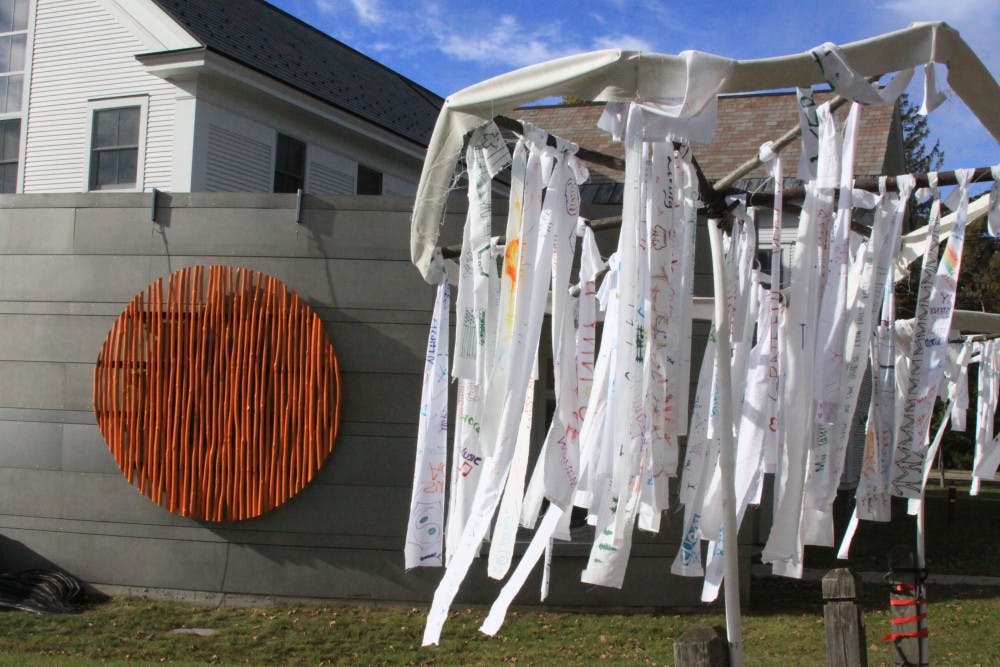2015 is a year of many 50th anniversaries including the release of The Sound of Music, the Medicare and Medicaid programs and the death of former British Prime Minister Winston Churchill.
If the toilet paper art installation outside of the Franklin Environmental Center at Hillcrest is still confusing to you, know there is a good reason for it. The month of October at the College boasts a number of events and installations aimed at celebrating another important 2015 anniversary: the 50th anniversary of the inauguration of the College’s Environmental Studies department, the oldest Environmental Science program for undergraduates in the United States.
Five years before the first Earth Day, Professor of Botany Howard Woodin and Professor of Geography Rowland Illick were inspired to turn their love of the environment into a formal academic department. For Woodin, who would become the department’s first director, starting the College’s first Environmental Studies department was a way to merge his passion for studying human impact on its surroundings with his love for teaching.
Students who committed to be a part of the new interdisciplinary program could choose between focusing on human ecology, earth science, and ecology, and were encouraged to pair their interest in the environment with other areas of study such as geography, psychology, biology and chemistry. Between 1968 and 1975, more classes that reflected the diverse interests of environmental studies majors at the time were added to the curriculum.
Though the Environmental Studies program was small to start, students all over campus became increasingly aware of their surroundings. The Environmental Quality club published a weekly column in The Campus as a way to share their passion, and their efforts led to the dining hall’s switching from paper to glass plates and the start of the bike-renting program. The late 1980’s brought the College’s recycling program, divestment movements and a newfound appreciation for Earth Day. The number of ES majors soared in the early 1990’s and attention to environmental issues at the College also grew.
Flash forward to today and Woodin and Illick’s efforts in developing the ES program are still being celebrated.
On Oct. 2, students and their families trekked down the hill to the Middlebury College Organic Farm Open House. Standing next to an array of pumpkins, garlic and carrots, current Environmental Studies major Karma Lama ’17 beamed as she gushed about her relationship with the farm.
“It’s a great way for me to take a lot of the things I’ve learned in class and put them into practice,” she said. “I mean, I now know how water-intensive it is to farm and that has helped my work here so much. This farm is a different dimension to the ES department other than academic. It’s real.”
The Organic Farm is not exclusively for students and faculty of the Environmental Studies department; it is a space for the entire community that allows students to retreat from the College and residents to bridge the gap between the town and the school. The $8,000 of organic fruits and vegetables it produces for Middlebury’s dining halls is not the only reason this space is important: the farm is common ground.
Most events celebrating the department’s 50th anniversary are still to come, including interactive campus installations, tree plantings and an assortment of lectures from esteemed environmental scholars.
On Thursday, Oct. 8, President and Founder of Dream Corps Van Jones will give a keynote address entitled “Green Jobs not Jails: Criminal Justice Ecology” in Mead Memorial Chapel. The following day from 12:30 to 2 pm, Schumann Distinguished Scholar at Middlebury Bill McKibben will moderate a discussion of several professors called “Environmental Science at 50: What’s Next?”.
If these fifty years are any indication of its future success Middlebury’s Environmental Studies program has much to look forward to from now until 2065.



